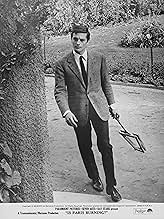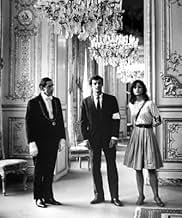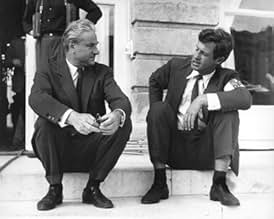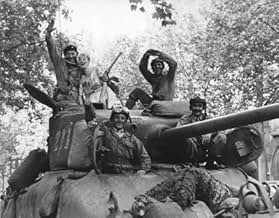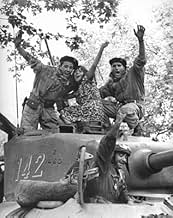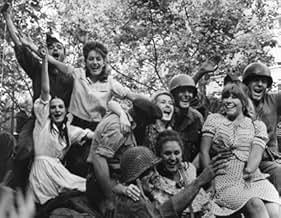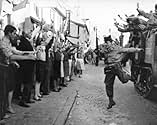IMDb रेटिंग
6.8/10
5.4 हज़ार
आपकी रेटिंग
1944 में पेरिस से जर्मन सेना का प्रस्थान.1944 में पेरिस से जर्मन सेना का प्रस्थान.1944 में पेरिस से जर्मन सेना का प्रस्थान.
- 2 ऑस्कर के लिए नामांकित
- 4 कुल नामांकन
George Chakiris
- GI in Tank
- (as Georges Chakiris)
Gert Fröbe
- General Dietrich von Choltitz
- (as Gert Froebe)
फ़ीचर्ड समीक्षाएं
Director Rene Clement brings together the finest French, American and German actors of the 1960s for a rather muddled historical epic. Released in 1966, "Is Paris Burning?" is a rather mixed bag of historical drama and confusion.
In August, 1944, the Allies are closing in on Paris. Hitler (Billy Frick) orders General von Cholitz (Gert Frobe, "The Longest Day") to take command and burn the city to the ground to prevent its capture. French resistance forces within the city won't permit this to happen, and Swedish consul Nordling (Orson Welles, "The Battle of Austerlitz") convinces Choltitz to make multiple concessions, allowing the resistance to make significant gains and hold on until the armed forces arrive.
The all-star cast is uniformly good, although many of the American stars have little to do. Gert Frobe is the real star of the piece. As Cholitz, he makes a strong and sympathetic character. Cholitz has to make important, difficult decisions on one hand, he's concerned about his men's safety; on the other, he is trying to follow orders. Welles is somewhat engaging, but he disappears partway through the film without leaving a lasting impression. The script, by Francis Ford Coppola and Gore Vidal, combines several stories, allowing the host of characters little time to do much of anything. Gallois (Pierre Vaneck) and Dr. Monod (Charles Boyer) try to break out of Paris and reach the Allies; Colonel Rol (Bruno Cremer) and Chaban (Alain Delon) organize the resistance forces; Nordling and tries to free Francoise Labe's (Leslie Caron, "Father Goose") husband from a POW camp. It's hard for any of these subplots to make much on an impact, but like "The Longest Day" and "Battle of Britain", the characters are kept distinct enough that they are easy to follow, despite major time lapses between appearances.
The German characters are portrayed by a host of familiar character-actors. Helmuth Schneider ("The Dirty Heroes") plays a Sergeant who throws a pessimistic Corporal (Otto Stern, "Commandos") into a detention cell; Gunter Meisner ("The Bridge at Remagen") is his usual, evil self as an SS Officer in charge of a prison train; Joachim Hansen ("The Eagle has Landed") is a moral officer who tries to help Nordling gain concessions; Wolfgang Preiss ("Von Ryan's Express") has little to do as the commander of a demolition squad; and Karl-Otto Alberty ("Battle of the Bulge") is an SS officer. The American actors tend to have clunky cameos: Kirk Douglas ("In Harm's Way"); Glenn Ford ("Casablanca Express"); Robert Stack and E.G. Marshall are all limited to one or two scenes. Anthony Perkins ("Catch-22") and Skip Ward make more of an impression as infantrymen waiting to liberate Paris.
Clement handles every shot brilliantly. There are several standout scenes. One sequence has partisans ambush a German armored car. One soldier escapes, still smoldering from burns from an exploded Molotov cocktail. He proceeds to hijack a passing French car and make the driver take him to HQ, where his gruesome burns alert the neat-and-clean officers that something is not right in the city. The scene in which Francoise Labe searches for her husband amongst a throng of prisoners in especially moving, and the conclusion is brilliant and unexpected. In another scene, a French squad occupied an old woman's apartment to fire on a German barricade, as the old woman watches while preparing herself a cup of tea. In another scene SS officers arrive to secure a painting for Hitler's birthday from the Louvre, before Frobe burns down the city. Frobe informs them that the Louvre is in French hands, and they reply "But it's right across the street!" Without missing a beat, Frobe tells them to take a white flag over and see if the French will let them in. This grim humor and wit add to the human story within the big picture.
A lot of attention to historical accuracy and detail went into the film's production. Costumes, from French civilian dress to military uniforms are all accurate. The exteriors are beautifully shot in and around Paris, often with excellently staged wide shots showing off the narrow streets and just how vast and battleground was. The scenes of the French resistance gathering in the streets to march on the Police Station, set to Maurice Jarre's thundering, jovial score, are most memorable. The spirit of revolution and joy of liberation is so well-portrayed that you can feel it with the characters on screen.
"Is Paris Burning?" suffers from annoyingly bad dubbing, overlength and a lack of focus, but these are nicks in any epic film, and cannot be avoided in order to tell such a vast story. As its heart, "Is Paris Burning?" is a fine movie about human freedom, told with brilliance and gusto.
In August, 1944, the Allies are closing in on Paris. Hitler (Billy Frick) orders General von Cholitz (Gert Frobe, "The Longest Day") to take command and burn the city to the ground to prevent its capture. French resistance forces within the city won't permit this to happen, and Swedish consul Nordling (Orson Welles, "The Battle of Austerlitz") convinces Choltitz to make multiple concessions, allowing the resistance to make significant gains and hold on until the armed forces arrive.
The all-star cast is uniformly good, although many of the American stars have little to do. Gert Frobe is the real star of the piece. As Cholitz, he makes a strong and sympathetic character. Cholitz has to make important, difficult decisions on one hand, he's concerned about his men's safety; on the other, he is trying to follow orders. Welles is somewhat engaging, but he disappears partway through the film without leaving a lasting impression. The script, by Francis Ford Coppola and Gore Vidal, combines several stories, allowing the host of characters little time to do much of anything. Gallois (Pierre Vaneck) and Dr. Monod (Charles Boyer) try to break out of Paris and reach the Allies; Colonel Rol (Bruno Cremer) and Chaban (Alain Delon) organize the resistance forces; Nordling and tries to free Francoise Labe's (Leslie Caron, "Father Goose") husband from a POW camp. It's hard for any of these subplots to make much on an impact, but like "The Longest Day" and "Battle of Britain", the characters are kept distinct enough that they are easy to follow, despite major time lapses between appearances.
The German characters are portrayed by a host of familiar character-actors. Helmuth Schneider ("The Dirty Heroes") plays a Sergeant who throws a pessimistic Corporal (Otto Stern, "Commandos") into a detention cell; Gunter Meisner ("The Bridge at Remagen") is his usual, evil self as an SS Officer in charge of a prison train; Joachim Hansen ("The Eagle has Landed") is a moral officer who tries to help Nordling gain concessions; Wolfgang Preiss ("Von Ryan's Express") has little to do as the commander of a demolition squad; and Karl-Otto Alberty ("Battle of the Bulge") is an SS officer. The American actors tend to have clunky cameos: Kirk Douglas ("In Harm's Way"); Glenn Ford ("Casablanca Express"); Robert Stack and E.G. Marshall are all limited to one or two scenes. Anthony Perkins ("Catch-22") and Skip Ward make more of an impression as infantrymen waiting to liberate Paris.
Clement handles every shot brilliantly. There are several standout scenes. One sequence has partisans ambush a German armored car. One soldier escapes, still smoldering from burns from an exploded Molotov cocktail. He proceeds to hijack a passing French car and make the driver take him to HQ, where his gruesome burns alert the neat-and-clean officers that something is not right in the city. The scene in which Francoise Labe searches for her husband amongst a throng of prisoners in especially moving, and the conclusion is brilliant and unexpected. In another scene, a French squad occupied an old woman's apartment to fire on a German barricade, as the old woman watches while preparing herself a cup of tea. In another scene SS officers arrive to secure a painting for Hitler's birthday from the Louvre, before Frobe burns down the city. Frobe informs them that the Louvre is in French hands, and they reply "But it's right across the street!" Without missing a beat, Frobe tells them to take a white flag over and see if the French will let them in. This grim humor and wit add to the human story within the big picture.
A lot of attention to historical accuracy and detail went into the film's production. Costumes, from French civilian dress to military uniforms are all accurate. The exteriors are beautifully shot in and around Paris, often with excellently staged wide shots showing off the narrow streets and just how vast and battleground was. The scenes of the French resistance gathering in the streets to march on the Police Station, set to Maurice Jarre's thundering, jovial score, are most memorable. The spirit of revolution and joy of liberation is so well-portrayed that you can feel it with the characters on screen.
"Is Paris Burning?" suffers from annoyingly bad dubbing, overlength and a lack of focus, but these are nicks in any epic film, and cannot be avoided in order to tell such a vast story. As its heart, "Is Paris Burning?" is a fine movie about human freedom, told with brilliance and gusto.
About 350 years earlier Henry of Navarre had captured just about all of France, but Paris and had been ruling as Henry IV for about five years but he decided he wasn't really king without his capital. He converted to the Catholic religion and Paris became united with the rest of the country. Henry decided that Paris was indeed worth a mass.
Fast forward to 1944. Maybe militarily Paris wasn't worth that much in defeating Hitler, but for the morale of a people being liberated from a brutal conqueror it was invaluable. When the forces of the Resistance in its many branches could no longer be contained with Allied armies only days from Paris, battle plans got changed and a Free French Division under General Phillippe Leclerc went in and helped the Resistance take the city.
Paris brule-t-il is the French cinema's answer to The Longest Day. It is dotted with cameos from French, German, and American film players and makes very effective use of newsreel footage blended into the finished product. You really do think you are watching an actual filmed record of the events as they happened.
The lead in this film is German actor Gert Frobe, better known to audiences as James Bond nemesis Goldfinger. The film opens with him being given command of the city by Hitler himself and given very specific orders to destroy the city before it was recaptured.
Frobe knows it and finally admits that the war is lost. He's concerned about what history will think of him should he do this terrible thing. He gets a direct order from Hannes Messemer playing Alfred Jodl and a reminder of what Hitler does to those who disobey him. Frobe's character General Von Choltitz died shortly after this film debuted and Jodl was executed after being tried at Nuremberg.
Jean-Paul Belmondo, Alain Delon, Jean-Pierre Cassel, Yves Montand are all playing roles of Resistance members. Leslie Caron has a poignant small part as a woman trying unsuccessfully to get her husband freed before the Nazis ship him off to Germany before retreating.
Americans in this film are Kirk Douglas as General Patton, Glenn Ford, as General Bradley and Robert Stack as General Siebert. Those three were put in briefly to insure some American box office in a French story. Funny no one thought of Douglas for the Patton biographical film classic four years later.
Orson Welles has a much bigger part as the Swedish consul general in Paris who negotiates between the Nazis and the Resistance before the Free French Division arrives. Another one of those brilliantly executed parts by Welles he did to get money for his own projects.
Director Rene Clement really made the people of Paris the star of this film. It is their tribute picture and a terrible reminder to people in every nation what it is like to live under a tyranny.
Fast forward to 1944. Maybe militarily Paris wasn't worth that much in defeating Hitler, but for the morale of a people being liberated from a brutal conqueror it was invaluable. When the forces of the Resistance in its many branches could no longer be contained with Allied armies only days from Paris, battle plans got changed and a Free French Division under General Phillippe Leclerc went in and helped the Resistance take the city.
Paris brule-t-il is the French cinema's answer to The Longest Day. It is dotted with cameos from French, German, and American film players and makes very effective use of newsreel footage blended into the finished product. You really do think you are watching an actual filmed record of the events as they happened.
The lead in this film is German actor Gert Frobe, better known to audiences as James Bond nemesis Goldfinger. The film opens with him being given command of the city by Hitler himself and given very specific orders to destroy the city before it was recaptured.
Frobe knows it and finally admits that the war is lost. He's concerned about what history will think of him should he do this terrible thing. He gets a direct order from Hannes Messemer playing Alfred Jodl and a reminder of what Hitler does to those who disobey him. Frobe's character General Von Choltitz died shortly after this film debuted and Jodl was executed after being tried at Nuremberg.
Jean-Paul Belmondo, Alain Delon, Jean-Pierre Cassel, Yves Montand are all playing roles of Resistance members. Leslie Caron has a poignant small part as a woman trying unsuccessfully to get her husband freed before the Nazis ship him off to Germany before retreating.
Americans in this film are Kirk Douglas as General Patton, Glenn Ford, as General Bradley and Robert Stack as General Siebert. Those three were put in briefly to insure some American box office in a French story. Funny no one thought of Douglas for the Patton biographical film classic four years later.
Orson Welles has a much bigger part as the Swedish consul general in Paris who negotiates between the Nazis and the Resistance before the Free French Division arrives. Another one of those brilliantly executed parts by Welles he did to get money for his own projects.
Director Rene Clement really made the people of Paris the star of this film. It is their tribute picture and a terrible reminder to people in every nation what it is like to live under a tyranny.
This film was a notorious turkey in 1966, but thanks to the recent DVD release it can be re-evaluated. It still doesn't come anywhere near classic status, but now we can see it in a format at least a little closer to how it should have been seen in the first place.
First, the dubbing -- the original theatrical release, which is the version released on VHS, is the single greatest case for subtitles in the history of film. It was execrable. On DVD, in French with English subtitles, the rhythms of the language are preserved and the distraction of having lip movement and the soundtrack so totally at odds with each other is gone. Unfortunately, the French track runs through the sequences featuring American stars, and that's a little disconcerting (though the French actor who dubbed Orson Welles does a very good Orson Welles impression). The solution of switching language tracks is inelegant, but useful. And there is no German track for the sequences featuring Gert Frobe. A better solution would have been to go the route of THE LONGEST DAY and run each sequence in the appropriate language with appropriate subtitles, but this film did not have a Darryl F. Zanuck producing it, willing to make those hard choices.
Second -- the screen format. Again, the VHS release was not letterboxed, and many of the shots and sequences demand the 2.35:1 ratio, particularly in the shots when the Resistance raises the French flag over the Prefecture of Police and Notre Dame. The VHS version is like going to Paris and looking at everything you see through a cardboard toilet paper tube.
What they couldn't do anything about in the DVD release was the "all-star" American actor casting. Kirk Douglas looks nothing like George Patton, and they made no effort to even try. Glenn Ford could have looked more like Omar Bradley with a little more attention to makeup, but when you're only in a couple of shots, and maybe working a couple of days, hey, why bother, right? At least with Orson Welles as Nordling and Robert Stack as Sibert we don't have the baggage of comparing a historic image to the image of the actor.
The biggest complaint about this movie was that it was confusing -- well, yes, but they were confusing times, which this movie brings out very well. But to the French a lot of the characters like Colonel Rol and General Leclerc are legendary. No real explanation of who they were and what they did is needed, like Patton would be to an American audience. So you really do have to know some of the background already. But for an American audience it is a lot easier if you don't try to keep straight who's who among the Resistance as long as you get the point, which IS clear, that there were several groups at odds with each other in the days before the Liberation and finally they were able to force the hand of the Allied generals and get them to change their strategy.
This film is basically a victim of American ethnocentrism. As an illustration: a while back I was visiting England not long after the film version of ALL THE PRESIDENT'S MEN had been released, and it was shown on the flight over. At one point while I was there I was discussing the film with our English hosts, and they made the telling point that they never could understand what all the fuss about Watergate was about anyway. In Great Britain, a simple vote of no confidence would have been put to Parliament and the government would have been turned out in a Knightsbridge minute. In IS PARIS BURNING?, Americans have no idea of what Nordling (Orson Welles) is talking about when he asks the German General Choltitz (Gert Frobe) if he is prepared to take the responsibility for destroying a thousand years of culture, and mentions Notre Dame and Sainte-Chappelle. We all know Notre Dame (or think we do, hunchbacks and all that), but Sainte-Chappelle? Ay, there's the rub. Most Americans don't know that Sainte-Chappelle is the absolute jewel of High Gothic (13th century) architecture. Where Notre Dame is imposing and overwhelming, Sainte-Chappelle is elegant and delicate. And most Americans are not aware that Choltitz is one of the most interesting figures of the war. He had a reputation for being a very efficient destroyer of cities, which is why Hitler gave him the job in the first place -- Rotterdam is not mentioned in the film, though Stalingrad is -- but his face-to-face interview with Hitler when he was given the assignment for Paris convinced him that Hitler had completely lost his mind. His disobedience of the Fuhrer's order meant he was shunned by Wehrmacht veterans after the war, but he saved Paris.
But if you forget the "hey-there" stunt casting ("Hey there, it's Kirk Douglas! Hey there, it's Orson Welles!") and forget trying to identify every single character in every single plot thread, and instead view Paris itself as the central character around which everything else revolves, then IS PARIS BURNING? can be a very rewarding film.
Paul Wilson, Theatre Department, Methodist College, Fayetteville, NC
First, the dubbing -- the original theatrical release, which is the version released on VHS, is the single greatest case for subtitles in the history of film. It was execrable. On DVD, in French with English subtitles, the rhythms of the language are preserved and the distraction of having lip movement and the soundtrack so totally at odds with each other is gone. Unfortunately, the French track runs through the sequences featuring American stars, and that's a little disconcerting (though the French actor who dubbed Orson Welles does a very good Orson Welles impression). The solution of switching language tracks is inelegant, but useful. And there is no German track for the sequences featuring Gert Frobe. A better solution would have been to go the route of THE LONGEST DAY and run each sequence in the appropriate language with appropriate subtitles, but this film did not have a Darryl F. Zanuck producing it, willing to make those hard choices.
Second -- the screen format. Again, the VHS release was not letterboxed, and many of the shots and sequences demand the 2.35:1 ratio, particularly in the shots when the Resistance raises the French flag over the Prefecture of Police and Notre Dame. The VHS version is like going to Paris and looking at everything you see through a cardboard toilet paper tube.
What they couldn't do anything about in the DVD release was the "all-star" American actor casting. Kirk Douglas looks nothing like George Patton, and they made no effort to even try. Glenn Ford could have looked more like Omar Bradley with a little more attention to makeup, but when you're only in a couple of shots, and maybe working a couple of days, hey, why bother, right? At least with Orson Welles as Nordling and Robert Stack as Sibert we don't have the baggage of comparing a historic image to the image of the actor.
The biggest complaint about this movie was that it was confusing -- well, yes, but they were confusing times, which this movie brings out very well. But to the French a lot of the characters like Colonel Rol and General Leclerc are legendary. No real explanation of who they were and what they did is needed, like Patton would be to an American audience. So you really do have to know some of the background already. But for an American audience it is a lot easier if you don't try to keep straight who's who among the Resistance as long as you get the point, which IS clear, that there were several groups at odds with each other in the days before the Liberation and finally they were able to force the hand of the Allied generals and get them to change their strategy.
This film is basically a victim of American ethnocentrism. As an illustration: a while back I was visiting England not long after the film version of ALL THE PRESIDENT'S MEN had been released, and it was shown on the flight over. At one point while I was there I was discussing the film with our English hosts, and they made the telling point that they never could understand what all the fuss about Watergate was about anyway. In Great Britain, a simple vote of no confidence would have been put to Parliament and the government would have been turned out in a Knightsbridge minute. In IS PARIS BURNING?, Americans have no idea of what Nordling (Orson Welles) is talking about when he asks the German General Choltitz (Gert Frobe) if he is prepared to take the responsibility for destroying a thousand years of culture, and mentions Notre Dame and Sainte-Chappelle. We all know Notre Dame (or think we do, hunchbacks and all that), but Sainte-Chappelle? Ay, there's the rub. Most Americans don't know that Sainte-Chappelle is the absolute jewel of High Gothic (13th century) architecture. Where Notre Dame is imposing and overwhelming, Sainte-Chappelle is elegant and delicate. And most Americans are not aware that Choltitz is one of the most interesting figures of the war. He had a reputation for being a very efficient destroyer of cities, which is why Hitler gave him the job in the first place -- Rotterdam is not mentioned in the film, though Stalingrad is -- but his face-to-face interview with Hitler when he was given the assignment for Paris convinced him that Hitler had completely lost his mind. His disobedience of the Fuhrer's order meant he was shunned by Wehrmacht veterans after the war, but he saved Paris.
But if you forget the "hey-there" stunt casting ("Hey there, it's Kirk Douglas! Hey there, it's Orson Welles!") and forget trying to identify every single character in every single plot thread, and instead view Paris itself as the central character around which everything else revolves, then IS PARIS BURNING? can be a very rewarding film.
Paul Wilson, Theatre Department, Methodist College, Fayetteville, NC
This film is a very well done dramatisation of the account of the liberation of Paris in August of 1944.History buffs take note;notice the mascot names of the tanks in General Leclerc's Free French armoured division.Many had Spanish names such as "Madrid" "Teruel" & "Zaragosa" as these vehicles were manned by anti-Fascist Spanish refugee fighters who played a largely important yet mostly un-acknowledged part largely ignored by mainstream historians about the WW2 period.
In August 1944, Adolf Hitler assigns General Dietrich von Choltitz (Gert Froebe) to be in the military governor of Paris and to burn the city in case of the Allied forces arrival. Meanwhile, the French resistance has internal fights of the different factions and leaderships. One French major convinces the Allied forces to liberate Paris from the Germans. General von Choltitz disobeys Hitler's orders and spares Paris from destruction.
"Paris brûle-t-il?", a.k.a. "Is Paris Burning?", is an underrated French super production about the liberation of Paris in World War II. It is impressive the number of stars in this movie, directed by René Clément; screenplay by Francis Ford Coppola; music by Maurice Jarre. There are many cameos of great actors and also a huge number of bit players. Unfortunately the dubbing in English is awful. Fortunately this German general did not destroy one of the most beautiful cities in the world. My vote is eight.
Title (Brazil): "Paris Está em Chamas?" ("Is Paris Burning?")
"Paris brûle-t-il?", a.k.a. "Is Paris Burning?", is an underrated French super production about the liberation of Paris in World War II. It is impressive the number of stars in this movie, directed by René Clément; screenplay by Francis Ford Coppola; music by Maurice Jarre. There are many cameos of great actors and also a huge number of bit players. Unfortunately the dubbing in English is awful. Fortunately this German general did not destroy one of the most beautiful cities in the world. My vote is eight.
Title (Brazil): "Paris Está em Chamas?" ("Is Paris Burning?")
क्या आपको पता है
- ट्रिवियाOne of the main reasons for the movie being filmed in black and white: the French authorities refused to allow red and black Nazi flags to fly in Paris, even for a movie. They agreed only to the use of black and gray Nazi flags.
- गूफ़Judging by Choltitz's own memoirs ('Soldat enter Soldaten", 1951) there never was an order to deliberately destroy Paris or its monuments. The orders concerned laming industrial plants, blowing bridges, crushing uprisings, and defending the town as a fortress, accepting collateral damage. Choltitz later found out these orders were addressed to his superiors, not to him. He does mention Hitler asking "Is Paris burning?" but says he was informed of this by others, whose names he does not give.
- भाव
Lieutenant Henri Karcher: [over the phone to his father] Hello, Papa? This is Lieutenant Karcher. Your son. In spite of your pessimstic view of my military career, I'd like to announce I've just made some prisoners of the general in command of Paris at the Hotel Meurice. He surrendered to me. But I'm still very bad at drill.
- क्रेज़ी क्रेडिटThe end credit sequence is in color.
- कनेक्शनFeatured in Magician: The Astonishing Life and Work of Orson Welles (2014)
टॉप पसंद
रेटिंग देने के लिए साइन-इन करें और वैयक्तिकृत सुझावों के लिए वॉचलिस्ट करें
- How long is Is Paris Burning??Alexa द्वारा संचालित
विवरण
- रिलीज़ की तारीख़
- कंट्री ऑफ़ ओरिजिन
- भाषाएं
- इस रूप में भी जाना जाता है
- Is Paris Burning?
- फ़िल्माने की जगहें
- Rue de la Huchette, Paris 5, पेरिस, फ़्रांस(barricades)
- उत्पादन कंपनियां
- IMDbPro पर और कंपनी क्रेडिट देखें
- चलने की अवधि
- 2 घं 55 मि(175 min)
- रंग
- पक्ष अनुपात
- 2.35 : 1
इस पेज में योगदान दें
किसी बदलाव का सुझाव दें या अनुपलब्ध कॉन्टेंट जोड़ें

![Bande-annonce [OV] देखें](https://m.media-amazon.com/images/M/MV5BOWYyYzkwZTEtOTI4YS00NzFjLWI0ZmYtM2E1N2RiYTk2ZmNkXkEyXkFqcGdeQXRyYW5zY29kZS13b3JrZmxvdw@@._V1_QL75_UX500_CR0)
